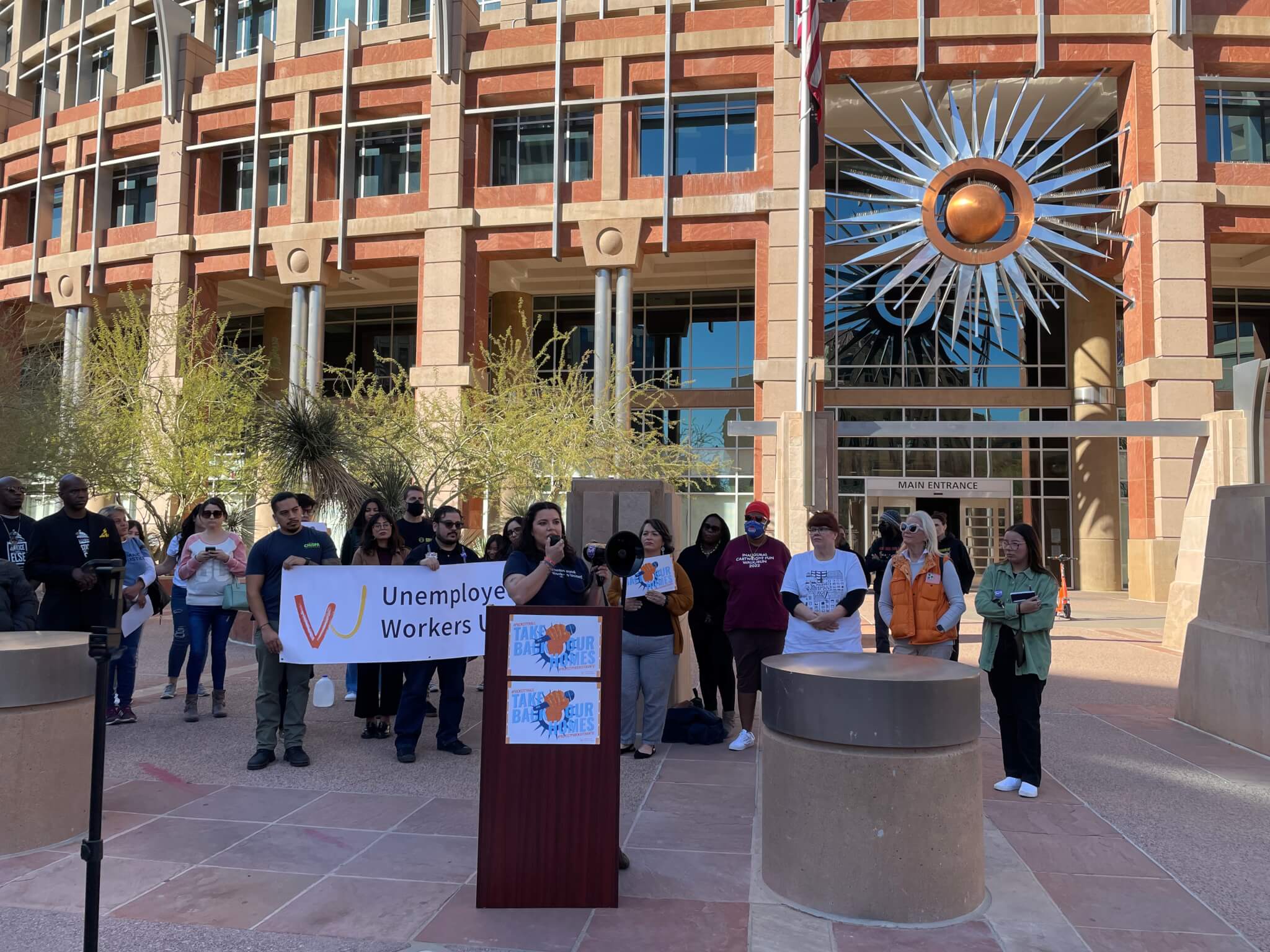
Activists rally outside of Phoenix City Hal on Feb. 1, 2023. (Photo by Jessica Swarner)
“We cannot bear to lose more of our community—our fathers, our mothers, our grandmothers and elders—to a cruel, ineffective system.”
Activists with Unemployed Workers United, Poder in Action, Fuerte AZ, Mass Liberation Arizona, and other groups are calling on Phoenix City Council to ban housing discrimination based on source of income.
A fair housing ordinance would prohibit landlords from turning down a renter because they receive public assistance, like housing vouchers.
“We are demanding that the mayor and the council not only put this on the agenda, they vote on it, but they actually make a commitment to housing justice,” Carla Naranjo with Unemployed Workers United told The Copper Courier.
Tucson City Council unanimously passed an ordinance like this in September, although former Arizona Attorney General Mark Brnovich said the ordinance violated state law.
All members of Phoenix City Council except Councilmember Jim Waring signed on to a letter asking new AG Kris Mayes to reconsider the decision.
Activists attended the Phoenix City Council meeting on Feb. 1 to bring awareness to the issue of people receiving government assistance being unable to find a landlord willing to accept them. They said they planned to continue attending the meetings until action is taken.
How the System Works
Families who fall into certain income limits can apply for a Section 8 voucher, and they often have to wait years to receive one. According to the Arizona Republic, in August there were over 16,000 people on Phoenix’s three-to-five-year waitlist.
Once someone finally gets a voucher, they typically have two to four months to find somewhere to use it. The vouchers can expire before someone can find an affordable place to live with a landlord who will accept one. Getting removed from the waitlist can mean being once again years away from having a stable place to live.
RELATED: This Bill Would Ban Landlords From Forcing Additional Fees on Arizona Renters
A 2018 Johns Hopkins study found that landlords’ prejudices against people using vouchers—as well as the bureaucracy of the program, including required yearly inspections—turned some of them away from participating.
If a person does find a place that will accept the voucher, they pay about 30% of their income toward rent while the federal government subsidizes the rest. A family continues to receive that subsidy for as long as their income stays the same.
If the income goes up, they still pay 30%, which means the amount they pay goes up, and the subsidy goes down to account for the adjusted income. If their income drops, the government can step in to make up the difference.
Keeping People on the Streets
Phoenix resident Yvonne Rubino told the council about her mother, who Rubino said died from chronic illness exacerbated by homelessness while trying to find a place to accept her voucher.
“I’m here sharing her story because her life was shortened due to a lack of community resources available to those who find themselves homeless,” Rubino said.
Rubino said she, her mother, and her son all lost their jobs and housing during the COVID-19 pandemic—but while Rubino and her son recovered, her mother became chronically homeless.
Rubino said once her mother received a voucher, she made “hundreds of phone calls” and visited properties but couldn’t find anyone to accept it.
“She would use her Social Security income to pay for hotel rooms which amounted to approximately eight days,” Rubino said. “She panhandled daily to keep her room.”
Rubino said she and her family paid $7,000 to try to help her mom stay housed for a couple of months, until her mom’s health worsened and she ended up in an emergency room. Rubino said her mom was moved to a short-term rehabilitation facility and died two weeks later.
“We cannot bear to lose more of our community—our fathers, our mothers, our grandmothers and elders—to a cruel, ineffective system,” Rubino said.
Looking for the latest Arizona news? Sign up for our FREE daily newsletter.
Support Our Cause
Thank you for taking the time to read our work. Before you go, we hope you'll consider supporting our values-driven journalism, which has always strived to make clear what's really at stake for Arizonans and our future.
Since day one, our goal here at The Copper Courier has always been to empower people across the state with fact-based news and information. We believe that when people are armed with knowledge about what's happening in their local, state, and federal governments—including who is working on their behalf and who is actively trying to block efforts aimed at improving the daily lives of Arizona families—they will be inspired to become civically engaged.


He said what? 10 things to know about RFK Jr.
The Kennedy family has long been considered “Democratic royalty.” But Robert F. Kennedy, Jr.—son of Robert F. Kennedy, who was assassinated while...

Here’s everything you need to know about this month’s Mercury retrograde
Does everything in your life feel a little more chaotic than usual? Or do you feel like misunderstandings are cropping up more frequently than they...

Arizona expects to be back at the center of election attacks. Its officials are going on offense
Republican Richer and Democrat Fontes are taking more aggressive steps than ever to rebuild trust with voters, knock down disinformation, and...

George Santos’ former treasurer running attack ads in Arizona with Dem-sounding PAC name
An unregistered, Republican-run political action committee from Texas with a deceptively Democratic name and ties to disgraced US Rep. George Santos...





